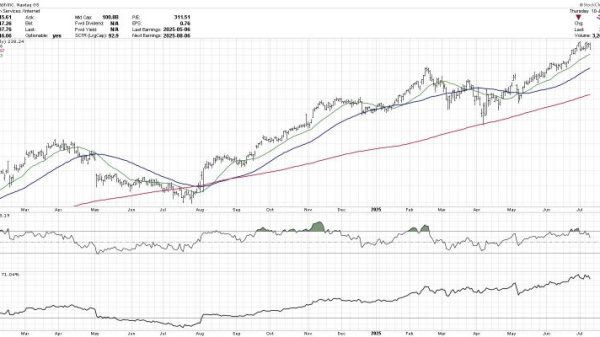The 90-minute “red state-blue state” debate hosted by Sean Hannity of Fox News featured a blizzard of statistics by Florida Gov. Ron DeSantis (R) and California Gov. Gavin Newsom (D). Here’s a quick guide to some of the more noteworthy claims and whether they stand up to scrutiny.
Hannity framed this as California losing population to Florida — “In 2021-2022, California’s lost 750,000 residents to other states …. Governor DeSantis, during that same two-year period, you gained 454,000 residents from other states” — which DeSantis eagerly accepted. Newsom pushed back with his own data, though for the first time since achieving statehood in 1850, California’s population is shrinking.
“They actually, at one point, ran out of U-Hauls in the state of California because so many people were leaving.”
— DeSantis
California media reported in 2022 that this was true. “U-Haul put out a news release in which it said California was the state that saw the biggest loss of one-way U-Haul trucks in 2021,” KGTV said. “In fact, U-Haul says it actually ran out of trucks to rent out here. The top destination for U-Haul’s trucks was Texas followed by Florida, Tennessee, South Carolina, and Arizona.”
“You mean, the last two years, more Floridians going to California than Californians going to Florida? … More Floridians coming to California than the other way around the last two years.”
— Newsom
How is this claim possible given the raw numbers that Hannity displayed, citing the Census Bureau? The missing words here are “per capita,” a phrase that Newsom usually slips in. California, of course, has a much higher population than Florida, so raw numbers can be deceiving. In 2022, 1.32 per 1,000 Floridians moved to California, and 1.31 per 1,000 Californians moved to Florida. The difference is not statistically significant.
“We have a 50-year low in the crime rate.”
— DeSantis
This statement is based on incomplete data, according to the Marshall Project, an online journalism organization that focuses on criminal justice issues.
“About half of the agencies that police more than 40% of the state’s population are missing from figures the Florida Department of Law Enforcement (FDLE) used for a statewide estimation,” the news organization said. Participation in national data collection is even lower, with less than 8 percent of Florida’s police departments included in an FBI federal database. (Many of the largest, such as the Miami Police Department, the Pinellas County Sheriff’s Office and the St. Petersburg Police Department, are missing from the national numbers. It is impossible, then, to compare Florida’s crime rate with that of other states.)
In any case, the crime rate in Florida has been steadily declining for three decades.
“Seven of the top 10 murder rates in the United States of America are red states.”
— Newsom
This is a favorite statistic of the California governor, one we have explored before. He is relying on data from Third Way, a left-leaning policy group, which says it conducted the study to combat Republican claims about high crime in blue states. Newsom’s use of the 2020 presidential electoral map to make his case leaves out important context: Many of the states on the top 10 list today have been on the list for decades, regardless of whether they voted for the Republican candidate for president.
“We’re near 50-year lows, down 55 percent violent crimes in the state of California from the 1990s.”
— Newsom
This is correct, according to the Public Policy Institute of California. After reaching a 1992 peak of 1,115 per 100,000 residents, California’s violent crime rate steadily fell, reaching a 50-year low of 391 in 2014. California’s violent crime rate increased by 5.7 percent, to 495 crimes per 100,000 residents in 2022. That is still 56 percent lower than the 1992 rate.
“In the last 10 years, we have had a 45 percent decline in homelessness. California’s had a 45 percent increase in homelessness.”
— DeSantis
This is correct, based on data from the National Alliance to End Homelessness. The group’s interactive website shows that Florida’s homeless population has decreased by 46 percent between 2013 and 2022, while California’s homeless population has increased by 45 percent in the same 10-year period.
“He has one of the most regressive tax rates in the United States of America. It’s the number three most regressive state in America …. He taxes low-income workers more than we tax millionaires and billionaires in the state of California.”
— Newsom
“Regressive” means that lower-income people are taxed at higher rates than top-earning taxpayers. In the first part of this statement, Newsom is referring to a study by the left-leaning Institute on Taxation and Economic Policy. Florida has no state income tax, but the study — which concluded that Florida ranks third among the most regressive states — says that by relying on sales and excise taxes, Florida has among the highest taxes on low-income households. The effective tax rate on the bottom 20 percent of households in Florida is 12.7 percent, the study says. The top one percent in Florida pay 2.3 percent of their income in taxes, compared to 12.4 percent in California, which the study lauds for its tax system.
That comparison — 12.7 percent effective tax on the poorest residents in Florida, compared to 12.4 percent on the wealthiest in California — appears to be the source of Newsom’s claim that DeSantis “taxes low income workers more than we tax millionaires and billionaires in the state of California.”
There are various ways to look at death rates from the coronavirus, making it especially susceptible to spin. Hannity set the stage for the discussion by showing statistics from the Centers for Disease Control and Prevention. “Your states’ death rates were also identical,” he said — 248.7 deaths per 100,000 in California and 252.8 for Florida. DeSantis readily agreed, while Newsom objected: “This is factually untrue.”
Our colleague Philip Bump delves more deeply into this exchange, but these numbers are from the start of the pandemic and are adjusted for age. Florida has a much higher percentage of elderly people than California, so an age adjustment is appropriate.
Newsom argued that DeSantis shifted course because of politics and, after being one of the first governors to shut down a state, reversed course and cast doubt on science. As a result, he argued, covid deaths in Florida were higher after vaccines were introduced. That is reflected by CDC data. CDC statistics show that in 2020, age-adjusted death rates in California were 68.7 per 100,000 in 2020, compared to 56.4 for Florida. In 2021, after the introduction of the vaccines, California’s death rate was 99.9 — compared to 111.7 for Florida. In other words, the death rate more than doubled in Florida, even after adjusting for age, in 2021, while it went up 45 percent in California in the same time period.
Newsom charged that there was a “29 percent higher death rate in the state of Florida versus the state of California.” He’s referring to death rates adjusted by population. California, with a population of 39 million and 110,208 coronavirus deaths, had a death rate of 282 per 100,000 people. Florida, with 22.2 million people and 81,238 deaths, had a death rate of 365 per 100,000.
His staff also pointed to a Los Angeles Times article published this week. “In raw terms, significantly more Floridians died on a per capita basis during the COVID-19 emergency than Californians,” the article said. “Of the four most-populous states, California had the lowest cumulative COVID death rate: 2,560 for every 1 million residents. Florida’s rate was 60 percent worse, with 4,044 COVID fatalities for every 1 million residents, according to a Times analysis of Johns Hopkins University data through early March, when the university ended its data tracking.”
But the article also acknowledged the numbers changed after adjusting for Florida’s older population: “When factoring in demographics, another estimate has Florida with an age-adjusted COVID mortality rate that’s only slightly higher than California’s. And when adjusting for how Florida’s population is relatively unhealthier than California’s, another estimate actually ranks Florida better.”
“I think about one of our Floridians, a lady named Penny Hopper. She actually survived a late-term abortion back in the day and they left her on the — on the table there, to basically wither away. Her grandmother came, saved her, brought her to a hospital, saved her, and she ended up living a good life.”
— DeSantis
DeSantis first mentioned Hopper in the Republican presidential debate in August. At the time, The Fact Checker took an in-depth look at her story and revealed new details. DeSantis has made a subtle adjustment in his retelling. He no longer claims she was abandoned in a pan on the back porch of the hospital. (Experts said a 23-week-old baby would have had little chance of survival.) But he still suggests the doctor was at fault. Our review of contemporary news articles and interviews revealed a different story: The doctor and nurses valiantly tried to save her and arranged for a police escort to rush the infant to a hospital that had a new type of incubator.
“He signed a bill banning any exceptions for rape and incest; and then he said it didn’t go far enough and decided to sign a six-week ban. … So extreme is your ban that criminalizes women and criminalizes doctors that even Donald Trump said it was too extreme.”
— Newsom
A political action committee tied to Newsom aired TV ads in Florida ahead of the debate charging that a law signed by DeSantis would subject women to criminal charges if they received an abortion beyond the six-week ban in the law — a claim the DeSantis campaign rejected as “a lie.” Democrats say the law has ambiguous language — “Any person who willfully performs, or actively participates in, a termination of pregnancy in violation of the requirements of this section” will be subject to a felony — but DeSantis has repeatedly said the penalties in the law apply to health-care providers, not women seeking abortion care.
“1,406 books have been banned just last year under Ron DeSantis’ leadership. … 1,406 books have been banned on your banning binge.”
— Newsom
Newsom is referring to a study by PEN America, an advocacy group that has an expansive definition of a book ban, including whether “access to a book is restricted or diminished.”
A local Florida NBC station concluded that about 300 book titles were removed from shelves across the state’s school districts in 2022, and there were wide disparities across the state. “Of Florida’s 67 counties, 21 of them removed books last year. Clay County in northeast Florida had the most removals with 177, followed by Martin County in the southeast with 98 removals,” the report said.
(About our rating scale)
Send us facts to check by filling out this form
Sign up for The Fact Checker weekly newsletter
The Fact Checker is a verified signatory to the International Fact-Checking Network code of principles





























